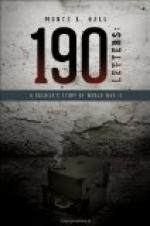And yet certain sights on the wasted field of war had so noble a lesson, a teaching so persuasive, that I should love to share with you the great certainties of those days. How harmonious is death within the natural soil, how admirable is the manner of man’s return to the substance of his mother earth, compared with the poverty of funeral ceremonial! Yesterday I thought of those poor dead as forsaken things. But I had been present at the burial of an officer, and it seems to me that Nature is more compassionate than man. Yes indeed, the soldier’s death is close to natural things. It is a frank horror, a horror that does not attempt to cheat the law of violence. I often passed close to bodies that were gradually passing into the clay, and their change seemed more comforting than the cold and unchanging aspect of the tombs of town cemeteries. From our life in the open we have gained a freedom of conception, an amplitude of thought and of habit, which will for ever make cities horrible and artificial to those who survive the war.
Dear mother, I write but ill of things that I have greatly felt. Let us seek refuge in the peace of spring and in the treasure of the present moment.
March 7, half-past ten.
DEAR BELOVED MOTHER,—I am filling up the idleness of this morning. I am rejoicing in the clear waters of the Meuse that give life to dales and gardens. The play of the current over weeds and pebbles makes a soothing sight for my tired eyes, and expresses the calm life of this big village that is sheltered by the Meuse hills. The church here is thronged with soldiers who possess, as I do, a definite intuition of the Ideal, but who seek it by more stated and less immediate means.
I am to board for a fortnight in the house in which, nearly two months ago, our joyous company used to meet. To-day I have seen the tears of these same friends, weeping to hear of the wounded and the dead.
I received your sleeping-sack, which is quite right. I am worried with rheumatism, which has spoilt many of my nights in billets these two months past.
Darling mother, here is a calm in the noise of that barrack-life which must now be ours. As there are none here but non-commissioned officers, they are all ordered to hard jobs, and I shall renew my acquaintance with brooms and burdens. We have been warned; we shall have to work with our hands. And so we learn to direct others.
March 7 (another letter).
Soft weather after rain. Bells in the evening; flowing waters singing under the bridges; trees settling to sleep.
March 11.
DARLING MOTHER,—I have nothing to say about my life, which is filled up with manual labour. At moments perhaps some image appears, some memory rises. I have just read a fine article by Renan on the origins of the Bible. I found it in a Revue des Deux Mondes of 1886. If later I can remember something of it, I may be able to put my very scattered notions on that matter into better order.




